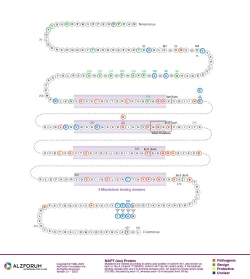Mutations
MAPT R370W
Quick Links
Overview
Pathogenicity: Frontotemporal Dementia : Benign
Clinical
Phenotype: None
Reference Assembly: GRCh37/hg19
Position: Chr17:44061278 C>T
dbSNP ID: rs17651549
Coding/Non-Coding: Coding
DNA
Change: Substitution
Expected RNA
Consequence: Substitution
Expected Protein
Consequence: Missense
Codon
Change: CGG to TGG
Reference
Isoform: Tau Isoform Tau-G (776 aa)
Genomic
Region: Exon 4a
Findings
This variant in exon 4a of MAPT is thought to be benign. Originally described according to nucleotide position in exon 4a (735), this variant was associated with a haplotype more common in controls than Alzheimer's disease patients (Lilius et al., 1999).
Exon 4a is excluded from the six major tau isoforms expressed in the human brain, but it is present in PNS-tau (P10636-1) and Tau-G (P10636-9), which are 758 and 776 amino acids long, respectively. Therefore, the position of this variant is in reference to these isoforms, rather than to isoform Tau-F (P10636-8).
Neuropathology
Not applicable.
Biological Effect
Unknown.
Last Updated: 20 Mar 2024
References
Paper Citations
- Lilius L, Froelich Fabre S, Basun H, Forsell C, Axelman K, Mattila K, Andreadis A, Viitanen M, Winblad B, Fratiglioni L, Lannfelt L. Tau gene polymorphisms and apolipoprotein E epsilon4 may interact to increase risk for Alzheimer's disease. Neurosci Lett. 1999 Dec 17;277(1):29-32. PubMed.
External Citations
Further Reading
Papers
- Sobrido MJ, Abu-Khalil A, Weintraub S, Johnson N, Quinn B, Cummings JL, Mesulam MM, Geschwind DH. Possible association of the tau H1/H1 genotype with primary progressive aphasia. Neurology. 2003 Mar 11;60(5):862-4. PubMed.
- Stanford PM, Brooks WS, Teber ET, Hallupp M, McLean C, Halliday GM, Martins RN, Kwok JB, Schofield PR. Frequency of tau mutations in familial and sporadic frontotemporal dementia and other tauopathies. J Neurol. 2004 Sep;251(9):1098-104. PubMed.
- Rademakers R, Cruts M, van Broeckhoven C. The role of tau (MAPT) in frontotemporal dementia and related tauopathies. Hum Mutat. 2004 Oct;24(4):277-95. PubMed.
- Ingelson M, Fabre SF, Lilius L, Andersen C, Viitanen M, Almkvist O, Wahlund LO, Lannfelt L. Increased risk for frontotemporal dementia through interaction between tau polymorphisms and apolipoprotein E epsilon4. Neuroreport. 2001 Apr 17;12(5):905-9. PubMed.
Protein Diagram
Primary Papers
- Lilius L, Froelich Fabre S, Basun H, Forsell C, Axelman K, Mattila K, Andreadis A, Viitanen M, Winblad B, Fratiglioni L, Lannfelt L. Tau gene polymorphisms and apolipoprotein E epsilon4 may interact to increase risk for Alzheimer's disease. Neurosci Lett. 1999 Dec 17;277(1):29-32. PubMed.
Alzpedia
Disclaimer: Alzforum does not provide medical advice. The Content is for informational, educational, research and reference purposes only and is not intended to substitute for professional medical advice, diagnosis or treatment. Always seek advice from a qualified physician or health care professional about any medical concern, and do not disregard professional medical advice because of anything you may read on Alzforum.


Comments
No Available Comments
Make a Comment
To make a comment you must login or register.